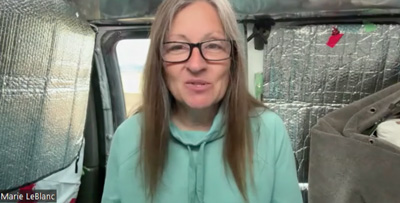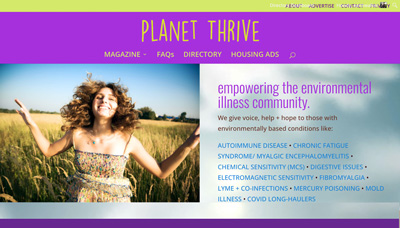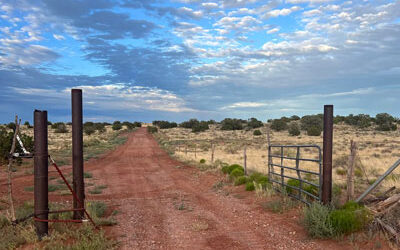 People with chemical sensitivities particularly have been systematically discredited with psychiatric labels to steer attention away from the industries responsible for our injuries. For fear of feeding into the psychiatric labeling of our community, many shy away from sharing our psychological experiences, I believe much to our own detriment. We are all entitled to a full range of emotions, and to sharing them with each other. Isis Feral of East Bay Pesticide Alert/Don’t Spray California, and the Bay Area Radical Mental Health Collective
People with chemical sensitivities particularly have been systematically discredited with psychiatric labels to steer attention away from the industries responsible for our injuries. For fear of feeding into the psychiatric labeling of our community, many shy away from sharing our psychological experiences, I believe much to our own detriment. We are all entitled to a full range of emotions, and to sharing them with each other. Isis Feral of East Bay Pesticide Alert/Don’t Spray California, and the Bay Area Radical Mental Health Collective
Here at Planet Thrive, we know that not only those with chemical sensitivities, but many people suffering overlapping invisible illnesses like lyme disease, chronic fatigue syndrome/myalgic encephalomyelitis, electrical sensitivity, mold related illness, gulf war syndrome, etc. have been diagnosed with psychiatric illnesses when physicians and other health care providers don’t have any answers for us. They don’t believe in or know the origin of our illness, their tests don’t uncover physical abnormalities, and they have no treatments for us that address the root cause rather than treat the symptoms. For those of us experiencing this abandonment by the medical system, becoming disabled and then being written off as “crazy” on top of it can certainly be traumatic. Then there is the disbelief and lack of support from family, friends, and co-workers, and the disillusionment that comes from the failure of constructs and institutions we were raised to believe in. I can go on and on. We have much to voice.
Below is an upcoming project submitted by the Icarus Project, the Bay Area Radical Mental Health Collective, and Activist Trauma Support that you might want to participate in if you have experienced and/or recovered from trauma.
Call for submissions:
SCARSONGS
An Anthology Articulating the Terrain of Trauma and Resilience
Trauma matters.
When safety and connection are shattered, when we live through pain and horror, when we experience mutual support and resilience, fault lines erupt across our lives and divide our communities. Exploring the fallout is not a sign of weakness; it is an essential part of preparing to rejoin struggles for sanity, peace, and liberation. When we spend time healing and articulating the contours of our experience, we become capable of illuminating the way for others and building a movement that can sustain itself in the long term.
We believe it is time for a reader that tells our stories and gathers our poems, radiates with our art and speaks our thoughts. Understanding and being able to relate, calling out and hearing other voices can help us to find individual and collective strength in the face of political, ecological, social and personal trauma.
Your input can be very valuable to other people.
This project is a collaboration of the Icarus Project, the Bay Area Radical Mental Health Collective, and Activist Trauma Support. Our aim is to create a beautiful, creative, readable document about trauma and resilience, drawing from a diversity of communities and backgrounds and addressing a wide range of topics and experiences. We invite submissions in a range of formats, including, but not limited to, essays, interviews, stories, poems, songs, illustrations, photographs, paintings, and collage. We invite submissions on:
– The wounding and the pain – abuse, assault, rape, war, death, police brutality, oppression, physical and structural violence, ritualistic and systematic abuse, natural disasters, catastrophic and chronic illness, birth and generational trauma, and political repression. Fear, anxiety, panic, dissociation, nightmares, addiction, post traumatic stress, depression, self-mutilation, self-harm, suicide.
– The healing and resilience – community support, creativity, grieving, nature, self-care, personal ritual, expression, therapy, activism, holding abusers and oppressors accountable, connecting with allies, looking inwards and speaking out.
– The importance of trauma work to building movements of collective liberation and social justice.
– Experiences of trauma support on an individual, community and political scale.
We understand trauma as self-defined and submissions can stay anonymous if desired.
The deadline for submissions is March 21st, 2010. You can also send in your ideas and ask for feedback on whether they would fit.
For more info and submissions, email: scarsongs@gmail.com.
theicarusproject.net
radicalmentalhealth.net
activist-trauma.net
——–
10 good reasons why trauma matters in political activism:
1. We’re not immune: We are behind the mainstream, which has long taken the issue seriously. Many of us still think we’re not affected by traumatic experiences and that we don’t carry all the shit we have lived through around with us. The truth is that we are human beings and our systems react to distress just like everybody else’s.
2 It can sabotage us: Trauma impacts our ability to be efficient in our work and get along with each other. Developmental trauma (the way we have been shaped by hardship in upbringing and society) plays out in the way we behave in meetings, collectives, actions, demos… We have great ideas but are often stuck in deeply entrenched, unhelpful patterns of behavior. Raising our awareness around trauma can help us to align our behavior with our intentions and to free up a lot of energy.
3. We care!: About the planet and its people, and especially about our comrades. We don’t want to leave them alone when they are suffering; we want them to feel our support. When somebody feels held, they are more able to really show up, connect with the people in their lives, invest their energy in the work, and take risks.
4. Knowledge is power: Understanding traumatic responses can help us understand dynamics in ourselves, in our groups and collectives, and even in wider society. Trauma patterns are also prevalent in history, especially regarding systemic oppression and internalized oppression. Integrating the lens of trauma into our grasp of history and the present moment is essential so that we can break the cycles and move beyond history repeating itself.
5. More resilient movements: After a shock trauma (meaning a major traumatic experience) people can be unable to function for a long period of time. If we help each other and ourselves heal, we can move through it. If we ignore it, the symptoms will last longer, people will suffer more, often ending up disillusioned and leaving political work.
6. Taking care of the whole person: Though wounds from traumatic experiences are not always visible, they are often more painful than physical ones. They are also often accompanied with great shame and guilt. We need a paradigm shift that takes us into account as whole people and that supports taking care of ourselves.
7. Trauma work is radical! One – Social transformation goes along with personal transformation. One without the other is bound to fail. Two – If we believe in mutual aid, it needs to include a basic understanding of trauma and social context, so that we can support others and ourselves effectively. Three – trauma work challenges old and often gendered belief systems and messages like “just tough it out”, “pull yourself together”, “boys don’t cry”, “women do the emotional work”, etc. and gives us a chance to come up with new ways of behaving.
8. You’re not alone: When we acknowledge trauma, we don’t have to take everything personally anymore. Our psychobiological systems react to stress. It’s normal. It does not mean we are weak or bad activists. Just imagine how much more powerful we can be if we can do away with identifying with our symptoms and focus on healing them instead.
9. Becoming strong: Healing from trauma can be empowering for yourself and the people around you. Working your way through it can give you greater perspective, meaning and strength. Especially if you feel supported throughout the process. Stronger people make stronger movements.
10. Compassion is a muscle: Exercising this muscle is crucial on our way towards social transformation. It counters the destructive socialization of western civilization that teaches us to avoid strong feelings and isolate, withdraw, consume, and become alienated. And it builds our capacity for a felt sense of safety and connection that fuels our collective strength in the struggle.










I have probably some chemical sensitivity, many things going on, am an electrical injury survivor, survivor of much trauma, but I don’t think it is very nice to say “psychiatric head cases” here in that context. What do you mean by this? The Icarus Project is all about mad pride. I am Crazy as in Crazy Horse was crazy and I am proud of it. I am glad you are getting the attention out there of this publication, but I was born with these special mad gifts, sick or not, and I don’t think it is very thoughtful to be using that terminology like that as if it is a negative thing…when a lot of us mad ones are putting together this publication. MAD LOVE, Nancy P. aka Kilsoquah
“I am proud to be maladjusted to an unjust society” –MLK
Hi Nancy,
I truly meant no offense. I was using the language that is used on us daily and it was not meant as a judgement of others. Thank you for bringing it to my attention; I have re-languaged my post in a way I hope does not offend. I don’t believe anyone is a “psychiatric head case” as I believe all illness has a bio-chemical component, and I do not believe that anyone should be blamed for their illness. We should all have compassion for everyone no matter what their situation.
HI, I understand. I think I am very sensitive too because as someone stuck for now in the mental health system, I do not get taken seriously too for my physical ailments sometimes. I have chronic fatigue too and other things. I have one doctor pretty good about it tho. I understand you meant well. It’s been one of those days. Take care, Nancy